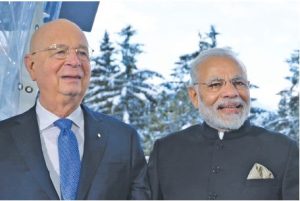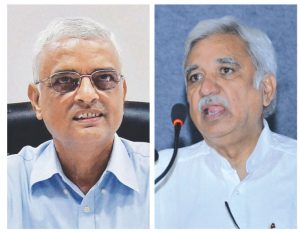The Davos Denial
 There’s a serious backstory to the presence of Narendra Modi at Davos. Despite the hype surrounding his presence and his address to the gathering, the fact is that he refused to attend during his first two years as prime minister. This was in reaction to his being denied an invitation to Davos post the 2002 riots when he was Gujarat chief minister and was keen to attract investment to the state. Heavy lobbying on his behalf by the Confederation of Indian Industry (CII) and corporate titans like Mukesh Ambani and the Hindujas could not sway World Economic Forum (WEF) chairman Klaus Schwab. Finally, when the WEF decided that with India having such a large presence at Davos and the country’s rising global profile, he could no longer be ignored, a senior Indian executive employed by the Geneva-based WEF (who happened to be a Gujarati) was asked to intervene. He met Modi who set two conditions: one, Schwab would have to come to Delhi and apologise in person, and, second, Modi would be asked to deliver the inaugural speech. Schwab flew down in June last year and delivered an apology and the invitation. He also, to use Modi’s own words, rolled out the red carpet.
There’s a serious backstory to the presence of Narendra Modi at Davos. Despite the hype surrounding his presence and his address to the gathering, the fact is that he refused to attend during his first two years as prime minister. This was in reaction to his being denied an invitation to Davos post the 2002 riots when he was Gujarat chief minister and was keen to attract investment to the state. Heavy lobbying on his behalf by the Confederation of Indian Industry (CII) and corporate titans like Mukesh Ambani and the Hindujas could not sway World Economic Forum (WEF) chairman Klaus Schwab. Finally, when the WEF decided that with India having such a large presence at Davos and the country’s rising global profile, he could no longer be ignored, a senior Indian executive employed by the Geneva-based WEF (who happened to be a Gujarati) was asked to intervene. He met Modi who set two conditions: one, Schwab would have to come to Delhi and apologise in person, and, second, Modi would be asked to deliver the inaugural speech. Schwab flew down in June last year and delivered an apology and the invitation. He also, to use Modi’s own words, rolled out the red carpet.
Tiger in the Room
The annual Raisina Dialogue has started to attract some global heavy-hitters and is now a must-attend event for those involved in geo-politics and geo-economics. The multilateral conference held in New Delhi was started in 2016 by the Observer Research Foundation, a think-tank, in collaboration with the ministry of external affairs. This year, apart from Prime Minister Narendra Modi, the attendees included former Afghanistan president Hamid Karzai, retired US general David Petraeus, naval chiefs from Japan, Australia, India and the US, the UK army chief, foreign, defence and security ministers from Russia, the US, Iran, Australia, Singapore, Poland, and Hungary, apart from past and present ambassadors of various countries. The 2018 theme was “Managing Disruptive Transitions: Ideas, Institutions and Idioms” but almost the entire focus during the two-day conference was on China and its increasingly dominant role in international affairs. The conclusion was that Beijing is disrupting established institutions and trade routes and building its own alternatives but the rest of the world has little idea how to respond. Scary thought.
Election Commissioner as Bellwether
 The choice of chief election commissioner has now become a political bellwether. Once a highly respected and independent institution, of late the Election Commission has acquired unseemly political baggage which is reflected in the appointment of the CEC, usually a retired bureaucrat. The outgoing CEC, AK Joti, was often charged with being close to the BJP, having served under Narendra Modi in Gujarat; more so after his decisions relating to elections in the state last year.
The choice of chief election commissioner has now become a political bellwether. Once a highly respected and independent institution, of late the Election Commission has acquired unseemly political baggage which is reflected in the appointment of the CEC, usually a retired bureaucrat. The outgoing CEC, AK Joti, was often charged with being close to the BJP, having served under Narendra Modi in Gujarat; more so after his decisions relating to elections in the state last year.
His replacement, OP Rawat (above, left), is made of sterner stuff. He has been critical of defections through the use of money and state machinery for intimidation (the maximum defections in recent elections have been to the BJP) and what he called the “creeping ‘new normal’ of political morality”. Rawat was also accused by the BJP of favouring Congressman Ahmed Patel’s Rajya Sabha nomination last year. Rawat’s tenure ends in December 2018 but the buzz is that he will be asked to quit before that and offered a tempting sinecure, so that Sunil Arora (right) can become CEC well in time for the general election, which, rumour goes, the BJP is likely to call earlier than the scheduled May 2019 date.
Arora served as joint secretary in the ministry of civil aviation and was CMD, Indian Airlines. His career blossomed under AB Vajpayee and Narendra Modi. There is no question where his loyalties lie.


